May 22, 2019
One T-Shirt At A Time
Allmade’s socially conscious, eco-friendly apparel line is making a difference in poverty-stricken Haiti.
Ryan Moor wants to change the world, one T-shirt at a time.
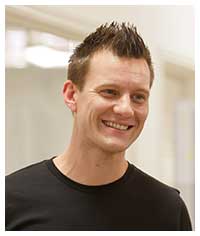 The founder of Ryonet – a web-based seller of screen-printing equipment and supplies that now generates about $50 million in annual sales – has spent the past three years spearheading Vancouver, WA-based Allmade (asi/34341), a socially conscious, eco-friendly apparel line.
The founder of Ryonet – a web-based seller of screen-printing equipment and supplies that now generates about $50 million in annual sales – has spent the past three years spearheading Vancouver, WA-based Allmade (asi/34341), a socially conscious, eco-friendly apparel line.
Ryonet and 10 screen printing businesses from across the United States are trying to influence consumers by offering an alternative to the traditional, environmentally destructive process of apparel manufacturing. Fashion generates 4% of the world’s waste each year, according to a recent Pulse of the Fashion Industry Report, conducted by the Global Fashion Agenda and Boston Consulting Group. Billions of T-shirts are made every year with fibers like industrial cotton, which is often grown in regions with minimal regulations – directly exposing workers and the environment to deadly pesticides and herbicides outlawed in the U.S. These materials are transported across the globe using bunker fuel, a heavy oil residue that is so toxic most countries won’t let ships use it within 200 miles of shore. The materials are spun into yarn, knitted into fabric and sewn into garments by workers – often in sweatshop conditions – for wages that don’t cover basic needs. In poverty-stricken countries like Haiti, these conditions have forced workers to give up their children because they simply can’t afford to provide for them.
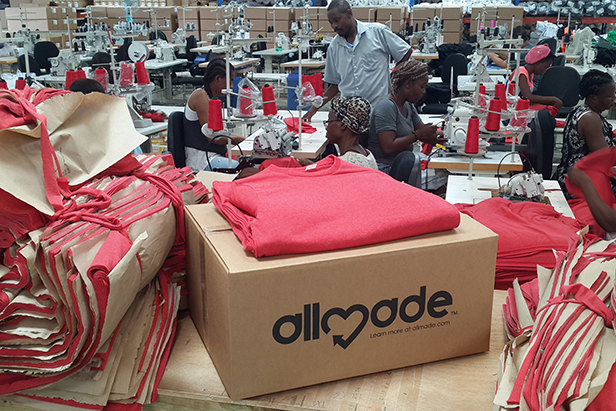
“Our mission is to create awareness and create a product that changes that,” Moor says. “We provide value in the form of a longer lasting shirt, more revenue and a better user experience. We provide the most socially responsible shirt in the market.”
Allmade’s tri-blend shirts are made from organic U.S.-grown cotton, recycled polyester and TENCEL Modal, a viscose made from sustainably harvested beech trees in PEFC-certified European forests. The materials are shipped to a Haiti factory to be sewn and sent back to the U.S. for sale. Allmade is working in cooperation with the GO Exchange (GoEx), a subsidiary of The Global Orphan Project, a Kansas City-based group committed to caring for children and families in crisis. As part of the collaboration, Moor, his wife and their two children went to Haiti a few years ago to see firsthand the dire living conditions.
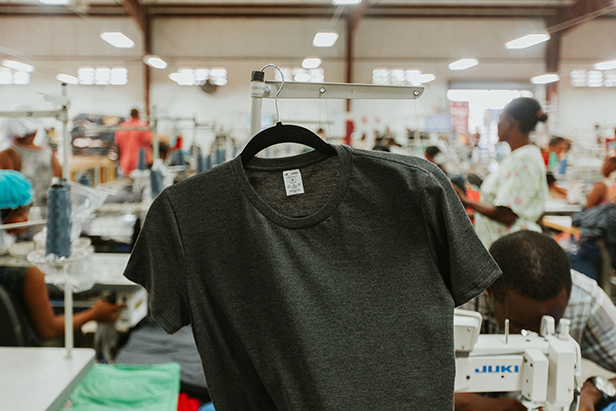
“There was a 2-year-old kid named Daniel who was my son’s age at time,” Moor says. “The orphanages were too full to take him, so he was left on the street. A teenager gave him his bed and half of his food rations. My wife was holding him and said, ‘this child is no different than my child.’ He just had different parents and they couldn’t take care of him.”
Shaken to his core, Moor recruited his screen-printing partners for another trip to the country. They learned how the average worker in Haiti earns a mere $3 a day to support a family of eight. As a result, many children become orphans because their parents can’t afford to provide food, shelter, clothing, education and basic healthcare. Moor and his partners discussed how they could make a difference by creating dignified, living-wage jobs that empower the people of Haiti to take care of themselves and their families.
“Our partners learned that they have the ability to change somebody’s life for real,” Moor says. “Once you experience it, it’s a game changer. Some call it a burden, some call it a mission, but we call it bringing the fire.”
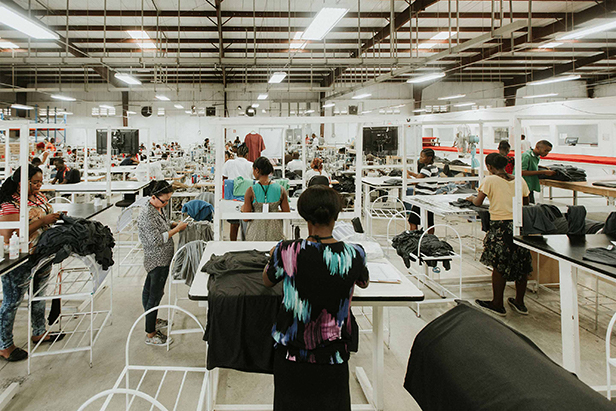
Ryonet organized a crowdfunding campaign on Indiegogo to raise the capital needed to fund the initial sourcing of fabric in the U.S. and apparel construction in Haiti. More than 500 backers donated a total of $123,975 which helped fund LIFE, the Haitian facility where Allmade shirts are produced. GO Exchange pays the factory workers three to four times the going rate for similar jobs in the area, an amount calculated to meet the basic needs of a Haitian household.
All of LIFE’s profits are dedicated to programs that support orphans such as the Transition Academy, which helps children aging out of community-sponsored care by providing them with housing, education, life and vocational skills to aid in a successful transition to adult independence. Those in the apparel classes receive hands-on education at the LIFE facility where Allmade shirts are produced. At least eight students have already graduated and are working full-time at LIFE.
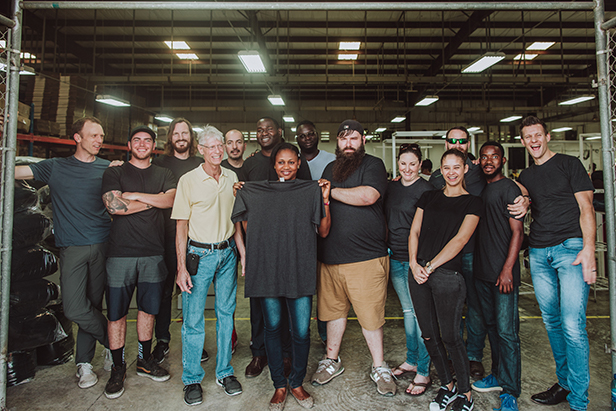
“Poverty isn’t just a situation – it’s also a mentality,” Moor says. “It’s hard to change that mindset. Instead of donating money to sponsor an orphan kid, let’s make a shirt that helps them in the first place. The school is changing future generations’ understanding of what it means to earn and do for your family, country and environment.”
